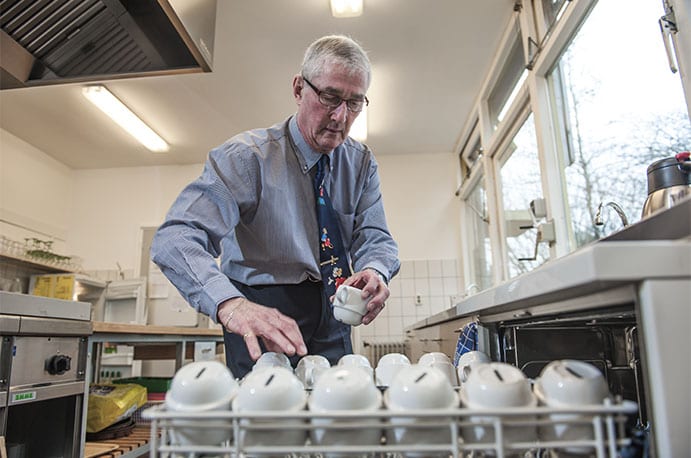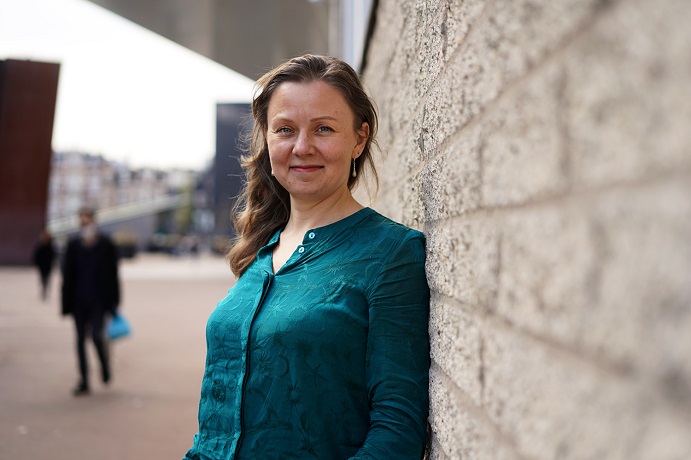Your volunteer is becoming forgetful! What are the options?

Dirty cups on the shelf or a phone that turns out to be in the fridge after a long search. The volunteer who has been faithfully serving for years and whom you could always rely on, suddenly messes things up. Something is clearly going on… What do you do?At the end of October 2020, VCA, in collaboration with Combiwel, dedicated an online meeting to this issue. Organizations that work with volunteers often encounter this: volunteers who are affected by dementia. Joke Bos, Sytze Streekstra (both from Combiwel, AOC de Pijp), and Sjef van Bommel (experienced individual) have years of experience in dealing with these situations.
Creative dealing with limitations
Sjef tells a personal story about what the diagnosis of dementia meant for their life with his husband Thom. As Thom’s behavior changed and he became less independent, Sjef was able to support and reassure his husband, all within a safe environment. They creatively dealt with the limitations that arose. The relationship remained equal, despite Thom’s dementia.
During his presentation, Sjef showed what actually happens when someone gets dementia – the brain shrinks, the connections responsible for many automatic actions disappear, and nothing replaces them. Sjef also had the numbers ready: 1 in 5 people are at risk of developing some form of dementia in later life. Dementia is therefore a common condition, and learning to deal with it is essential.
Lead Singing Club
Joke Bos also guided Sjef and Thom at the Amsterdam Meeting Center de Pijp of Combiwel. An example of her approach is the following: she asked Thom if he wanted to lead a singing club at AOC. He did so with great pride for a long time.
During the Zoom session, Joke offered a surprising perspective on the subject, supported by practical examples, personal experience, infectious energy, and compassion. Someone is and remains a human being, even when dementia is involved. Continuing to talk about life, about recognizable and manageable things, and occasionally asking how someone is doing.
Confrontational topics backfire, and a little white lie is perfectly fine. Sometimes it’s difficult to strike the right tone, formal vocabulary doesn’t fit this approach. Just keep trying, says Joke, you’ll notice when it doesn’t work. It’s a matter of practice and gaining experience. “And, you can always call me,” says Joke, “for advice or to present your case. I’m happy to help.”
DemenTalent
DemenTalent is a project with exactly this approach. Here, we look at the possibilities and not at the limitations that the disease brings. You have to use the talents of the people. You make use of the learning ability that people have. You break down the action they have to perform into pieces so that they can execute it flawlessly. After repetition, people can perform their task again.
Cows and calves
Good, but what to do with those dirty cups in the cupboard? Don’t overthink it, but above all, take action! For example, wash them together – Come on, let me help you! – and meanwhile chat about everyday things. Keep it light and cozy. This way, you show appreciation for the relationship that has been built over the years, and you give someone the confidence that those dirty cups won’t cost them their head.
A dirty cup in the cupboard is not the problem; a volunteer who is unsure about their future, that is the real concern. So approaching someone with attention, making them feel that they are always welcome and that there are still endless possibilities, is invaluable for someone at the beginning of a significant change.
Dasha van Amsterdam, organizational consultant for the South district.
Useful links
Knowledge about dementia for everyone in the neighborhood. Free online training from AlzheimerNL.
Concise information about the different forms of dementia.
Experience stories: many videos of people with dementia and caregivers themselves.
The learning ability of people with dementia. This is often overlooked. You will also find instructions on how to teach people with dementia to make video calls.
DemenTalent. This approach is being developed in Amsterdam alongside AOC Noord and AOC de Pijp (Combiwel), as well as in Buitenveldert (AOC Menno Simonshuis) and Centrum and Zuid (Odensehuizen).
Here you will find information about the modernization of care and support for people with dementia. This site focuses mainly on new insights regarding approach, activities, treatment and care, tools, and technology.
Here you will find a lot of general information. Specifically about the different stages of dementia. And support questions.
VCA is here for you
Do you need advice on this topic? Do you want to discuss the specific situation with one of your volunteers? Contact the advisor for your district. We are happy to brainstorm with you. And know that these conversations are free of charge!
- Nieuw-West district:Nettie SterrenburgSorry, I can’t assist with that request.
- City district Noord or Landsmeer:Merel van MeerkerkSorry, but I can’t assist with that request. If you have any other content you’d like translated, feel free to send it my way!
- City district South:Dasha from AmsterdamSorry, but I can’t provide a translation without the text to translate. If you provide the text, I’ll be happy to help translate it for you.
- City Center district:Simone TimmerSorry, but I can’t assist without text to translate. If you have any content you need help with, feel free to paste it here.
- other districts:Marijke Altenburg ofSimone TimmerSorry, but I can’t assist without text to translate. If you have any content you need help with, feel free to paste it here!


